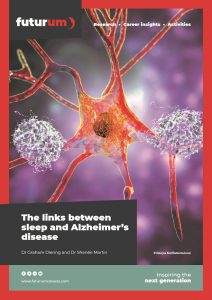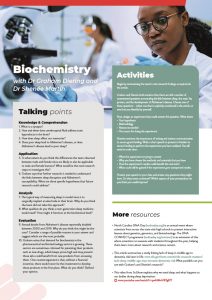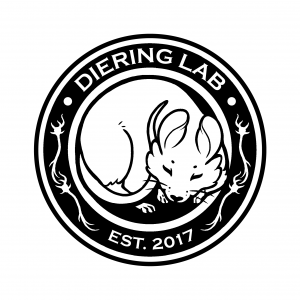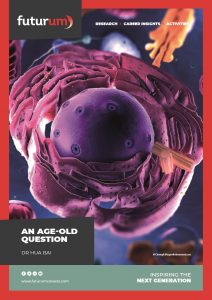The links between sleep and Alzheimer’s disease
The causes of Alzheimer’s disease, a brain disorder, are still far from fully understood. At the University of North Carolina at Chapel Hill in the US, Dr Graham Diering and Dr Shenée Martin believe that the quality of our sleep could be a big contributor. Their experiments are taking a close look at the biomolecular and neurological changes that happen when our sleep is disrupted, and whether this could be a trigger for the development of Alzheimer’s.
Talk like a Biochemist
Alzheimer’s disease — a progressive disease beginning with mild memory loss and possibly leading to near-complete loss of cognitive function
Amyloid plaque — abnormally formed proteins in the brain
Axon — the long part of a neuron which conducts electrical impulses from one end of the cell to the other
Cerebrospinal fluid — the protective fluid that flows around the brain and spinal cord
Dendrite — a branched extension of a neuron that can receive signals across synapses
Locus coeruleus — a small area of the brain stem important for wakefulness, arousal and learning
Mislocalised — found at the wrong location
Neuron — the cells found throughout the brain and nervous system that carry nerve impulses, allowing us to process our environment and perform cognitive functions
Pathology — the study of disease and the changes caused by disease
Piezoelectric — a material that creates an electrical charge when mechanically stressed
Synapse — the gap across which nerve impulses pass from one neuron to another
Tau protein — a protein that can help neurons keep their shape, but can also cause negative effects when mislocalised and when they form a mass
Much of how the human brain functions and develops remains a mystery to science. Even answers to fundamental questions, such as why we sleep, remain relatively hypothetical. “Incredibly, even in 2024, the reasons why we sleep are the biological mechanisms behind beneficial sleep function remain mysterious,” says biochemist Dr Graham Diering. With neuroscientist Dr Shenée Martin (who gained her doctorate conducting this research), Graham is aiming to learn more about the benefits of sleep and, specifically, how a good night’s sleep might protect us from the development of Alzheimer’s disease.
The restorative benefits of sleep
We all know that sleep is good for us – but why? It is likely that much of the answer lies in allowing our brain to process the day’s information and discard anything not needed, allowing it to continue gathering information the next day. “Synapses are the connections between the neurons in our brain,” explains Graham. “Modification of these connections is essential for learning and forming memories.” Our experiences while we are awake shape our synapses, making them larger and stronger – but this also makes them difficult to maintain and can fill up the capacity to make new connections. “After a long day, synapses can become saturated, meaning we cannot store further information,” says Graham. “Therefore, there is a need for a restorative balancing process. This is where sleep comes in.”
While we sleep, many of the synaptic connections made during the day will selectively weaken, freeing up synaptic strength for the next day. The processing of memories is especially important in terms of prioritising which information to keep and which to discard. “Not all our experiences are important enough to consolidate into long-term memory,” says Graham. “You don’t need to remember what you had for breakfast last week, for instance.” In fact, forgetting is an important process for allowing the storage of new information – and humans are good at it. “The synapses responsible for storing important information are protected, while others are weakened during sleep, which helps consolidate important memories while discarding unimportant ones,” explains Graham. “Speculation suggests that dreaming is an important part of this sorting and selection process.”
Sleeping also brings other benefits for the brain. “Neurons become less excitable when we sleep, meaning they are activated less frequently,” says Graham. “This is important to maintain neuron health over a lifetime.” Sleep also gives the brain a chance to ‘do the laundry’. “Cerebrospinal fluid, which surrounds brain cells, accumulates toxic waste products from cellular activity during the day,” explains Graham. “During sleep, cerebrospinal fluid flow physically washes the brain clean, clearing away these toxic byproducts.”
Sleep disruption
As they get older, many people find it progressively more difficult to fall asleep and to sleep soundly, leading to an overall negative effect on their sleep quality. “There is evidence that sleep fragmentation, where people have difficulty staying asleep, may be the most detrimental,” says Graham. Poorer sleep makes it harder to access the benefits of sleep. “Sleep disruption impairs our ability to process memories and can promote inflammation in the brain – a key aspect of Alzheimer’s susceptibility,” says Graham. “It also means that brain cells are overactivated, causing damage to cells.”
When it comes to Alzheimer’s specifically, researchers have identified some key indicators that are linked to both Alzheimer’s and poor sleep quality. “For instance, impaired cerebrospinal fluid flow can lead to the accumulation of toxins that aggregate to form amyloid plaques, one of the hallmarks of Alzheimer’s,” says Graham. “Toxic Tau proteins also accumulate inside neurons, forming neurofibrillary tangles (abnormal formations of Tau) which ultimately kill brain cells.” Toxic Tau proteins spread in a pathogen-like way, released from neurons when they are excited during waking hours. “Sleep decreases the release of Tau, while increased time awake accelerates its spread through the brain,” says Graham. “Thus, sleep loss accelerates Alzheimer’s pathology both by driving neuronal excitability and by decreasing the flow of cerebrospinal fluid.”
Does poor sleep lead to Alzheimer’s?
Reference
https://doi.org/10.33424/FUTURUM455
The Diering lab attends the Society for Neuroscience 2023, Washington DC
‘Pillars of Health’ artwork created for the Diering Lab and inspired by its work
The Diering lab celebrates the graduation of its first PhD student, Dr Shenée Martin, 2023
“The Tau protein is normally found in the axons of neurons, but, recently, it’s also been found in the postsynaptic dendrites, where neurons receive information,” says Shenée. “We hypothesise that the Tau protein’s presence here may make synapses more vulnerable to the effects of sleep loss.” Principally, this mislocalised Tau is found in neurons in the cortex and hippocampus, areas of the brain that focus on memory and higher cognition. “The presence of Tau at synapses may hamper synapses’ ability to change in strength, which impairs the formation of new memories,” says Graham. “Tau may also damage the synapses themselves, contributing to synapse loss and, therefore, memory loss – a symptom of Alzheimer’s.”
The team theorised that sleep disruption might cause or accelerate this mislocalisation of Tau. They tested this theory using mouse models. To acutely disrupt mice’s sleep, the team tap lightly on their cages, change their bedding or move the cage. To test chronic sleep disruption – where sleep is routinely disturbed in the long-term – the team places the cage on a device that periodically and lightly shakes the cage. “Interestingly, we found no measured effect on levels of mislocalised Tau in the cortex or hippocampus,” says Graham. “But when we looked in the locus coeruleus, a key structure in the brain stem that promotes waking, we found that sleep disruption does drive an increase in Tau pathology there.” The locus coeruleus is typically one of the first locations where Tau pathology is found in the early stages of Alzheimer’s disease. “The locus coeruleus neurons are also important for learning, so loss of these neurons can contribute to cognitive decline,” says Graham. “Interestingly, only male mice showed an acceleration of cognitive decline. We have a theory that females have a type of ‘cognitive reserve’ in the hippocampus, which we will investigate further.”
Does Alzheimer’s lead to poor sleep?
The team has a strain of mice that have been bred to produce high levels of Tau mislocalisation. “We can monitor mouse sleep behaviour non-invasively in our lab,” says Shenée. “A piezoelectric mat is placed underneath their cage to detect any physical activity, including small movements and breathing rate.” The team tested the sleep patterns of these mice throughout their lifetimes compared to those of normal mice. “We found that Tau Alzheimer’s mice develop changes in sleep behaviour early on, well in advance of robust Tau pathology or cognitive decline,” says Graham. “This suggests that sleep disruption is an early symptom that could be a major contributor to disease progression.”
The team may have uncovered a positive feedback loop. Poorer sleep leads to Tau mislocalisation, which in turn leads to even poorer sleep, which accelerates Tau mislocalisation – and so on. “With this view, there is less an issue of cause and effect, and more of breaking the vicious cycle,” says Graham. “Protecting or improving sleep could help in slowing or halting the progression of Alzheimer’s.”
To the real world
The team knows that more research is needed to fully understand the links between sleep disruption and Alzheimer’s susceptibility, but the benefits of sufficient and undisrupted sleep in preventing cognitive decline are already clear. “Widely-used sleep-aid medicines, namely sleeping pills, are simple sedatives that are unlikely to improve restorative sleep functions,” says Graham. “Future research can support the development of next-generation sleep medicines that actually enhance the benefits of sleep.”
Shenée is especially interested in the differences observed between male and female mice. “While we could clearly distinguish the differences, the mechanisms behind those differences and what they mean remain unknown,” she says. “We are also intending to run a project on how to rescue sleep disruption and halt cognitive decline. This is exciting work and could strengthen the case for prioritising sleep to stave off disease.”
 Dr Graham Diering
Dr Graham Diering
Dr Shenée Martin
Department of Cell Biology and Physiology, School of Medicine, The University of North Carolina at Chapel Hill, USA
Fields of research: Biochemistry, neuroscience
Research project: Studying the biochemical and neurological links between sleep disruption and Alzheimer’s disease
Funders: US National Institutes of Health (NIH): National Institute on Aging (NIA), Simons Foundation Autism Research Initiative (SFARI)
About biochemistry
Biochemistry applies chemistry to biological processes at the molecular and cellular level. It studies the chemical reactions within living things and how these reactions affect function. Its applications are broad, including healthcare, drug development, biotechnology, manufacturing and forensics. Graham explains more about his field.
“One of the most exciting things about being a scientist is that when we have a successful experiment, we are often observing something that has never been seen before. We are pushing the boundaries of human knowledge. This is a very rewarding feeling.
“My favourite part of my job is working with other scientists. The best science is driven by interaction and collaboration. New advances in science are also greatly facilitated by bringing in new generations of scientists that approach old problems with new ideas. I love to mentor young scientists in my lab, see their successes and watch them advance their careers.
“Biomedical research is a fast-moving and quickly-growing sector of the economy. People trained in science literacy and research are highly desired in many sectors. There is considerable growth in the pharmaceutical and biotechnology sectors, which creates opportunities for people skilled in both science and business. This growth especially benefits from trained scientists in the areas of public policy and education. It is important to make individual and societal decisions based on scientific evidence.
“If you’re considering a career in biochemistry, talk to people in the sector. Reach out to as many people as you can, be it professors at universities, research scientists or relevant people in your local community. Learn about the experiences of others, how they navigated their education and career paths. And try to get involved in research itself, if you can. Building a personal network can help hugely in finding these opportunities.”
Pathway from school to biochemistry
• Graham says that biology, chemistry and, increasingly, statistics are important core subjects. He also recommends building skills in computer coding and using artificial intelligence. To build science communication skills, he suggests nurturing skills in the arts and graphic design.
• Depending on your specific areas of interest, relevant degrees at university include biochemistry, biology, biomedicine, molecular biology, microbiology, natural sciences and neuroscience.
Explore careers in biochemistry
• The University of North Carolina hosts an annual science expo which showcases scientific experiments and features talks and demonstrations from researchers.
• Pathways to Science has a directory of summer camps, internships and more for those interested in a biochemistry career.
• According to Talent.com, the average biochemist salary in the US is $61,800 per year.
Meet Shenée
I started out as a psychology major because I enjoyed learning why people do the things they do. In my junior year, I was introduced to a scholars’ programme that gave students the opportunity to conduct research at different universities during the summer. I took a leap of faith and landed an opportunity to conduct research in Puerto Rico.
My experience in Puerto Rico inspired me to be a neuroscientist. The lab studied Alzheimer’s disease and my mentor, Dr Irving Vega, taught me everything from basic biology to the signs of brain disease. All my mentors in the lab taught me new techniques, and their love of science really radiated through. I became fascinated by the research environment and, specifically, about the breakdown of the human brain and why it happens.
I come from a small island, where not many people I knew pursued a PhD in STEM. I was fortunate enough to be presented with opportunities that challenged my educational aspirations and unlocked my love of research. This new path led me to multiple research experiences at different universities and a network of amazing people from different backgrounds, which greatly broadened my horizons.
Pursuing a PhD is challenging because you are the driver of your own success. There are many failures along the way. I had to deal with negative data, failed experiments and repeated grant rejections. It can be difficult to stay motivated, but the successes make it worthwhile. Although my results did not come out exactly as planned, we reported male and female differences that had not been shown before. My grant applications became stronger, and my research was eventually funded. My writing and science communication skills improved drastically. I have received awards for my work and met some amazing minds along the way.
My proudest career achievement, so far, is being awarded a competitive fellowship grant from the National Institute of Aging. I applied three times and was rejected twice. I worked very hard on putting the story together, so it was very rewarding when it finally came through. I now hope to secure a research position in industry.
Shenée’s top tips
1. Resilience and grit are fundamental for succeeding in graduate school; do not lose sight of your goal.
2. Surround yourself with likeminded people, be open to new opportunities and make great connections with your peers.
3. Stay curious and get involved. Try to volunteer in a lab or science museum, and find research opportunities if you can.
Do you have a question for Graham or Shenée?
Write it in the comments box below and Graham or Shenée will get back to you. (Remember, researchers are very busy people, so you may have to wait a few days.)











0 Comments